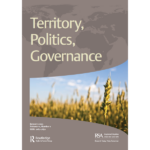2024 RSA Annual Conference Plenary Sessions and Speakers
For all information on the Plenary Sessions and Speakers for the RSA 2024 Annual Conference, please see below. To return to the main conference website click here.
Wednesday 12th June 2024, 09.00 – 10.30 CEST
Opening Plenary: Global Challenges, Regional Collaboration and the Role of Places
More information to follow.

Rafael Boix is a Professor of Applied Economics at the Department of Economic Structure of the University of Valencia. He is also a researcher at the Economics of Culture Research Unit (ECONCULT) and a member of the Program Committee of the DELoS PhD program in Development Economics and Local Systems at the University of Florence. Previously, he has held positions as a researcher and professor at the Autonomous University of Barcelona and has been a visiting researcher at Politecnico di Milano and a visiting professor at the University of Florence.
Rafael’s current research interests focus on the economic impacts of cultural and creative industries on places, the patterns of innovation in local production systems and clusters, and the application of artificial intelligence and machine learning to regional analysis. He has published over a hundred articles in specialized journals and books and is the author of numerous policy reports. Furthermore, he is associate editor of the Journal of Regional Science.
Rafael possesses extensive experience in research projects funded by the European Union, national, and regional agencies. Additionally, he has been involved in consultancy projects for the OECD, the European Commission, as well as various national, regional, and local authorities.
Creative Lights and Cultural Shadows in Regional Policies
Culture and creativity have emerged as potent elixirs in the realm of economic policy over the past three decades. They have been hailed as transformative forces by some, while others decry them as sources of societal discord. Applied with varying degrees of thoughtfulness, they’ve shaped regional and urban policies, often with unpredictable outcomes.
Despite their prominence, there remains a significant gap in our understanding of their precise impact and location. In my presentation, I will unveil the first worldwide geography of creativity by region alongside the findings of two extensive and comprehensive studies wherein we assess its policy-balanced economic impacts across nearly 80 countries and its influence on well-being in European regions.
A key takeaway is the diverse impact of creativity-driven policies, depending on the objectives and the developmental stage of regions and countries, and they may not be good for everyone. Furthermore, such policies may widen the gap between developed and underdeveloped regions.

Roberta is Professor of Economics in the Department of Political and Social Science in the Università di Pavia. She has a Laurea in Economics at Università Bocconi, a Master of Science in Development Economics at the University of Oxford (St. Antony’s College) and a Doctor of Philosophy at the Institute of Development Studies, University of Sussex. Her research focuses on development economics, regional economics, innovation in developing countries, clusters and small enterprises, multinationals and Global Value Chains. She has working experience with Orkestra, Inter-American Development Bank, EC, UNIDO, ILO, ECLAC-UN, UNCTAD.
A Green Window of Opportunity for Peripheral Regions?
The green transformation has profound implications for the global economy and hence for the prospects of development in latecomer countries as well as in peripheral regions. To understand how the capacity to seize green windows of opportunity (GWOs) differ across countries and regions, I will focus on sectoral systems and concentrate the attention on two related, albeit distinct, components: (a) the preconditions to take advantage of the opportunity and (b) the strategic responses of public and private actors with respect to seizing the GWOs. Four different scenarios can be identified: (1) the effective seizing of opportunity, (2) the missed opportunity, (3) the active approach and (4) the distant opportunity.
In the different scenarios, there is a variety of policy options for supporting developing countries and peripheral regions in their efforts to enhance the green development strategies, focusing both on the opening and augmentation of windows of opportunity and on the construction of requisite sectoral systems of production and innovation.

Alessandro Muscio holds the position of Full Professor of Applied Economics at the University of Foggia, Italy. He is a member of the university board and oversees the university’s spinoff and patent commission. He holds a Ph.D. in Economics of Production and Development from Insubria University (Italy) and an M.A. in Development Economics from the University of Sussex (UK). He was a Marie Curie Fellow in Science & Technology Policy Studies at SPRU – University of Sussex (UK).
In his academic capacity, Alessandro has conducted extensive scientific empirical fieldwork on SMEs and clusters in Italy, regional innovation systems, academic knowledge transfer and entrepreneurship. Alessandro also served as a Science and Technology Policy Specialist at Technopolis Group, UK Office, and currently holds the role of a board member at the European Future Innovation System Centre in Brussels.
With over two decades of experience, Alessandro specialises in academic research and policy evaluation within the realms of regional innovation policy and university-industry interactions. His professional engagement extends to conducting numerous studies and policy evaluations for both the European Commission (EC) and national government bodies. Alessandro acted as a national expert for Italy in the EC Regional Innovation Monitor Plus initiative and also conducted a European analysis of Industry 4.0 and digital transformation for the World Bank based on Horizon 2020 data. Currently, Alessandro is involved in shaping the new European Innovation Scoreboard (EIS) and the Regional Innovation Scoreboard (RIS) for the period 2024-2027. Additionally, he is contributing to a study on innovative legislative practices surrounding emerging technologies commissioned by EISMEA, and is the principal investigator in a national project focusing on women’s entrepreneurship and innovation within academia.
From Classrooms to Breakthroughs: Unveiling the Nexus between Schooling and Innovation
The fundamental impact of human capital on innovative performance is an undisputed finding in the innovation literature. The knowledge, skills, and creativity of individuals are considered central drivers of innovation in organisations, regions, and countries. In this context, university education is deemed especially relevant in shaping the competitive advantage of economic systems and has been under the scrutiny of both innovation scholars and policymakers for decades. Universities play a pivotal role in fueling innovation across various industries, providing students with essential knowledge and skills to generate new products, processes, and business models. However, while universities undeniably play a crucial role, it is essential to recognize that human capital formation is a complex and multifaceted phenomenon, which is influenced not only by factors such as institutional context and culture but also by the secondary education systems.
Since 1999, the Bologna Process has promoted numerous reforms aimed at ensuring comparability in the standards and quality of higher education qualifications in Europe. In
contrast, secondary school systems still vary significantly from country to country. One of the most striking differences concerns the relevance attributed to vocational training
programs. Vocational training plays a crucial role in preparing students for specific careers and industries, focusing on developing practical skills and knowledge directly applicable to the workplace.
This paper analyzes the impact of secondary school education on innovation performance in European regions. It is based on the idea that, as noted by Backes-Gellner and Lehnert (2021), despite the common belief that innovation requires academically educated workers, vocational education and training can drive the innovation performance of economies. In the opinion of the authors, while investing in higher education or HRST can play a crucial role in fostering innovation performance, directing investments towards improving schooling may be more significant. This is not only due to its higher social impact but also to its potential to leverage innovation, especially considering the still persisting wide differences in schooling among European regions and countries (NEET rates, school abandonment, etc.). To test our hypotheses, we utilize Eurostat and European Commission (EC) Cohesion Data from the last two programming periods. We assess the extent to which secondary school systems and EC policy, specifically the European Social Fund theme on educational & Vocational Training, can contribute to innovation performance in European regions.

Patrizio Bianchi is Chairholder of the Unesco Chair “Education, Growth and Equality” and emeritus Professor of Applied Economics at the University of Ferrara, where he founded the Faculty of Economics (1998) and was Rector (2004-2010). He was Councilor of the Emilia-Romagna Region for Education, University and Research (2010-2020) and Minister of Education of the Italian Government chaired by Mario Draghi (2021-2022). He is member of the Accademia nazionale dei Lincei.
In the late 80s and in the 90s, Patrizio Bianchi advised the Chinese Government for the industrial development of the Guang Dong Province, the Interamerican Development Bank Presidency for the development of the internal areas in Argentina, and UNIDO and OECD for the development of Northern Africa countries.
After the Rectorate he assumed the role of Councilor for European Development Policies, School, Training, Research, University and Labour of the Emilia-Romagna Region. in 2012-14 he managed the restart of educational activities after the earthquake of May 20-29, 2012; then, he directed the activities for the design and activation of the big data and artificial intelligence technopole in Bologna. As Minister of Education of the Italian Government chaired by Mario Draghi, he reopened the schools after Covid-19 in the entire country and designed and implemented the reform of the Technical school and of the High tech school. At the international level he co-chaired the Unesco Committee preparing the “UN Summit on Transforming Education to Transform the World”, which opened the General Session of the UN assembly, on September 19, 2022.
Abstract
Since 1970, and in particular after 1995 (WTO) we have seen unprecedented global economic growth, but we have also experienced an unprecedented population increase as well as an acceleration in global warming.
After trade liberalization, a deep transformation of the global production cycle was determined by the offshoring of sections of production from the developed countries US to developing countries, in particular to China (The Global Value Chains Model), but the Global Value Chain production model requires economic reliability and political trust in a condition of long-term stability.
The 2008 financial crisis, the 2019 Covid crisis, the 2022 Ukraine war crisis determine instability, uncertainty and dependency anxiety that restrain international trade and global production, reducing cooperation and increasing tensions between states, and therefore the GVCs Model declines in favour of reshoring and protectionist policies.
Since 2008 international trade has begun to decline because after the crisis international reliability has declined and therefore the GVCs have more and more difficulties to guarantee efficient production flows, but, after 2008 the global GDP continues to grow, because after the crisis a new intangible and borderless economy was rapidly developing: the data-driven digital economy is leading the economic and social change.
With the subprime mortgage crisis both in the US and in China, the financial market rapidly shifts enormous resources towards new digital businesses, supported by state intervention that captures the strategic, military and political value of new technologies. This does not happen in Europe, where after the great growth driven by the entry of the Euro, it was not possible to unify the local capital markets and formulate a unitary strategy for the development of a sector with high strategic, political and military impact.
Since 2013, the European Union has lost global market shares in high-tech sectors but remains competitive in electronics linked to climate and environment sectors, pharmaceuticals and scientific instruments linked to environmental technologies and human technologies.
The real challenge for Europe is to invest in the sectors of climate technologies and technologies for individual and collective well-being, applying all the most advanced technologies, but having at the centre social justice, equality and democracy, which are the identity of Europe.

Kira Gartzou-Katsouyanni is a Leverhulme Early Career Fellow at the Department of Politics and International Relations (DPIR) of the University of Oxford. Previously, she was a postdoctoral fellow at the Hellenic Observatory and the European Institute of the LSE, from where she also holds her PhD. Her research on the political economy of place has appeared in the Cambridge Journal of Regions, Economy and Society; New Political Economy; Politics & Society; and Governance, among other journals. Moreover, she is the co-editor of a Special Issue on “firm-centred, multi-level approaches to overcoming semi-peripheral constraints”, which is forthcoming in Studies in Comparative International Development. She has also co-authored a book on The Greco-German Affair in the Euro Crisis: Mutual Recognition Lost? (Palgrave Pivot, 2018). Her newest project, funded by the Leverhulme Trust, is entitled “Land inequality and the politics of place in advanced democracies”, and it aims to develop and test a theory linking the landholding distribution in productive sectors and political preferences at the local level.
Obstacles to Local Cooperation in Fragmented, Left-behind Economies
Fostering cooperation among local stakeholders is a core aim of place-based policies, and it can generate economic benefits and help restore a sense of agency in left-behind communities. However, relatively little is known about how to induce local cooperation in low-trust, institutionally weak areas. In my presentation, I will develop an integrated theoretical framework to help diagnose the precise obstacles to cooperation faced in different types of adverse settings. Such a diagnosis can help design tailored local- and macro-level policies to address the obstacles to local cooperation. I will demonstrate the utility of the proposed framework drawing empirical material from local areas in Greece, based on a medium-n comparative case study design.

Simona Iammarino is Professor of Applied Economics at the Department of Economics and Business Sciences of the University of Cagliari; Lei visiting Professor at the Department of Geography & Environment of the London School of Economics & Political Science; LSE-Canada Blanch Center Board Member; affiliated with the Gran Sasso Science Institute (GSSI), L’Aquila. She was Professor of Economic Geography at LSE lei (2009-2022), where she served as Head of the Department of Geography and the Environment (2014-2017) and member of the LSE Council (2016-2020).
Simona’s main research areas are: Multinationals, processes of globalization and local economic development; economic geography of innovation and technological change; regional and local systems of innovation; policy for regional and local economic development. Simona has published more than 70 articles in peer-reviewed scientific journals, 2 books as co-author, about 30 chapters, and numerous working papers, policy reports, etc.
Simona is co-editor of the Journal of Economic Geography, and member of the RSA Board and Chair of the RSA Journal Committee. She has extensive experience in research projects and international consultancies for various organizations (eg European Commission, OECD, United Nations, various government agencies).
Friday 14th June 2024, 12.30 – 13.30 CEST
Closing plenary – TPG Lecture – Contentious Territories: Revisiting the Center-Periphery Cleavage

In recent times, the many and overlapping crises have increased inequalities, triggering social and political conflicts. In particular, the center-periphery cleavage has manifested itself in various ways: from the protest against the big infrastructures located at the borders of the big cities to the riots of the marginalised banlieus. In addition to these, struggles for national independence have interacted with claims for social justice. Building upon recent processuali developments in social movement studies and presenting some novel empirical evidences, this keynote will reflect on the emerging forms of territorial contention.
Territory, Politics, Governance is an interdisciplinary journal from the Regional Studies Association. It is committed to the development of theory and research in territorial politics and the governance of space. The journal creates a platform on which to explore the interface between territory, politics, economy, identity and the organisation of political space. It confronts topical and emergent issues of world economic and political concern. The journal publishes original, high quality international scholarship from this growing, international and increasingly vibrant field directed at a worldwide academic audience and at policy makers, activists and other communities of practice.
The journal is indexed in Clarivate Analytics’ Social Sciences Citation Index and Scopus and has a significant circulation footprint as it is distributed with its sister journals, Regional Studies, Spatial Economic Analysis and Area Development and Policy. It is essential reading for academics and practitioners alike. For more details on the journal, go to www.tandfonline.com/journals/rtep20.

Donatella Della Porta is professor of political science, founding dean of the Faculty of Political and Social Sciences and Director of the PhD program in Political Science and Sociology at the Scuola Normale Superiore in Florence, where she also leads the Center on Social Movement Studies (Cosmos). Among the main topics of her research: social movements, political violence, corruption, democracy and political parties. She has directed a major ERC project Mobilizing for Democracy, on civil society participation in democratization processes in Europe, the Middle East, Asia and Latin America. During her career, she has received prestigious international prizes and recognitions such as the Forschungspreise of the Alexander von Humboldt Stiftung, awarded in November 2021, for life achievements as a highly prominent international scholar; the Mattei Dogan Prize, awarded in 2011, for distinguished achievements in the field of political sociology, and the Harry Frank Guggenheim Career Development Award in 1990. In 2012 she has been nominated member of the European Academy; in 2022, she has been nominated International Honorary Member of the American Academy of Arts and Sciences; in 2023, she has been nominated Academica of the Accademia Nazionale dei Lincei. She holds PhD Honoris Causa from the Universities of Gotenborg, Bucharest, Lausanne, Jyvaskyla, Peloponneso and Cyprus. She is the author or editor of 90 books, 150 journal articles and 150 contributions in edited volumes, Citations Google Scholar: h Index 99; 52000 citations, in (August 2023).
TPG Lecture – Contentious Territories: Revisiting the Center-Periphery Cleavage
In recent times, the many and overlapping crises have increased inequalities, triggering social and political conflicts. In particular, the center-periphery cleavage has manifested itself in various ways: from the protest against the big infrastructures located at the borders of the big cities to the riots of the marginalised banlieus. In addition to these, struggles for national independence have interacted with claims for social justice. Building upon recent processuali developments in social movement studies and presenting some novel empirical evidences, this keynote will reflect on the emerging forms of territorial contention.

Professor Klaus Dodds is Executive Dean for the School of Life Sciences and Environment at Royal Holloway and Co-Director of the Living Sustainably research catalyst (with Professor Redell Olsen). He is a Visiting Professor at the College of Europe, Warsaw Poland.
He researches in the areas of geopolitics and security, ice studies and the international governance of the Antarctic and the Arctic.